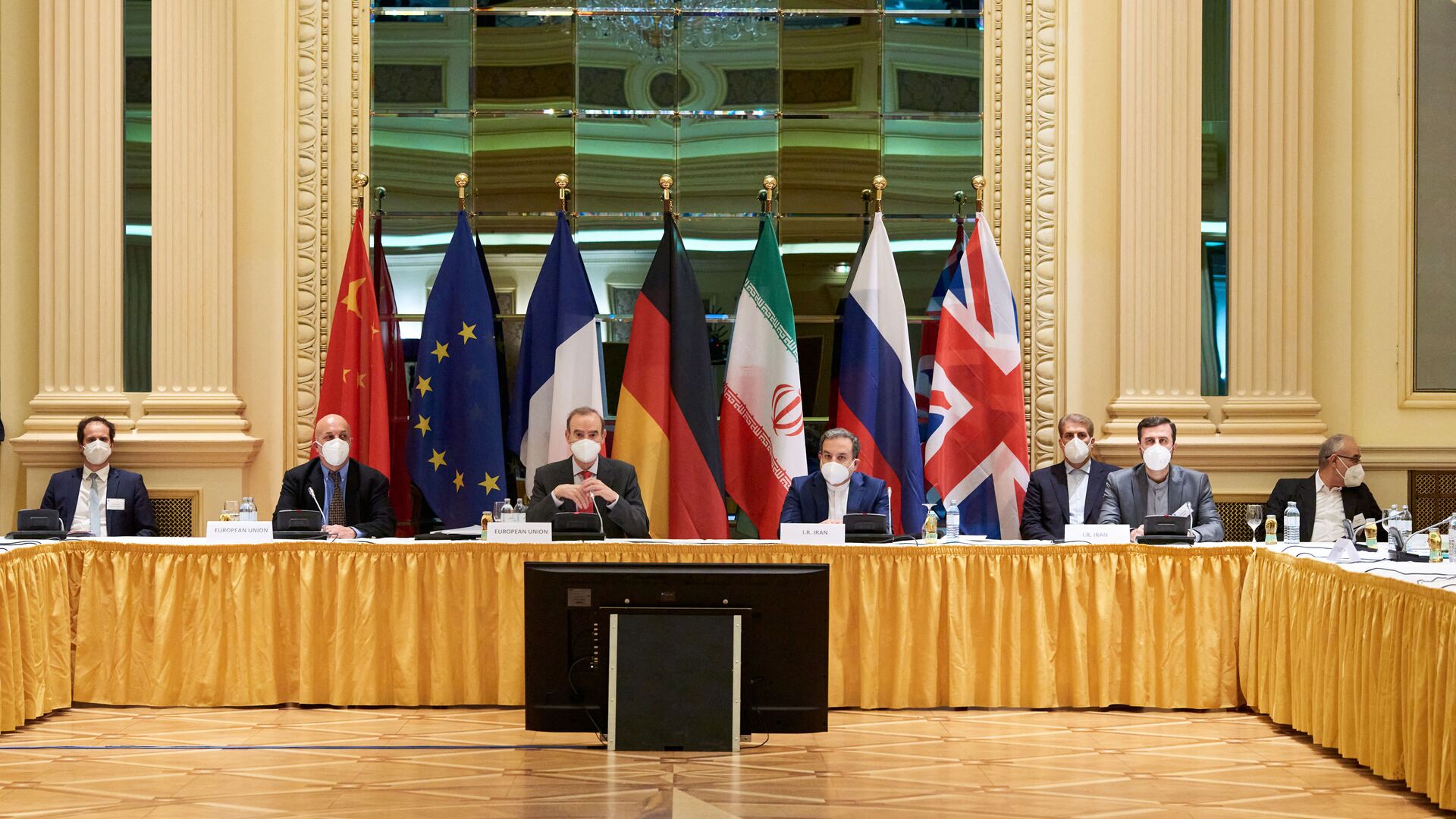https://sputnikglobe.com/20211018/us-not-pessimistic-about-jcpoa-vienna-talks-with-iran-but-says-they-cannot-go-on-indefinitely-1090016915.html
US 'Not Pessimistic' About JCPOA Vienna Talks With Iran, But Says They Cannot Go on Indefinitely
US 'Not Pessimistic' About JCPOA Vienna Talks With Iran, But Says They Cannot Go on Indefinitely
Sputnik International
US State Department spokesperson Ned Price said Monday that Washington was not "optimistic, not pessimistic," but simply "clear-eyed" about a new round of... 18.10.2021, Sputnik International
2021-10-18T18:25+0000
2021-10-18T18:25+0000
2021-10-18T19:10+0000
iran
joint comprehensive plan of action (jcpoa)
us state department
vienna talks
https://cdn1.img.sputnikglobe.com/img/07e5/04/08/1082567891_0:151:3291:2002_1920x0_80_0_0_3176e594730362ecf6d58d38b0f6d612.jpg
As Iran prepares to return to Vienna, Austria, for a seventh round of talks with the US on returning to the 2015 nuclear deal that lowered economic sanctions against the Islamic Republic, the US is posturing in favor of a more stringent deal than that agreed to in 2015.The US pulled out of the deal in 2018, with then-US President Donald Trump claiming Iran was secretly violating the deal and reimposing sanctions, although the deal's other parties were unconvinced by US claims. Nonetheless, Iran began reducing its own commitments to the deal, producing more refined uranium in higher purities, in an effort to convince Washington to return to the deal.US and Israeli officials claim Iran seeks a nuclear weapon and have vowed to stop them from acquiring it, although Tehran has forsworn all weapons of mass destruction and the head of Israeli military intelligence recently said "they are not heading toward a bomb right now."Earlier, officials from the European Union, a party to the 2015 nuclear deal, downplayed the possibility of a meeting with Iran about the nuclear deal outside of the Vienna framework.Similarly, Price said that "the destination we seek is in Vienna, not an intermediate step in Brussels."Iran and the US are expected to begin their seventh round of talks in Vienna in early November.
iran
Sputnik International
feedback@sputniknews.com
+74956456601
MIA „Rossiya Segodnya“
2021
News
en_EN
Sputnik International
feedback@sputniknews.com
+74956456601
MIA „Rossiya Segodnya“
Sputnik International
feedback@sputniknews.com
+74956456601
MIA „Rossiya Segodnya“
iran, joint comprehensive plan of action (jcpoa), us state department, vienna talks
iran, joint comprehensive plan of action (jcpoa), us state department, vienna talks
US 'Not Pessimistic' About JCPOA Vienna Talks With Iran, But Says They Cannot Go on Indefinitely
18:25 GMT 18.10.2021 (Updated: 19:10 GMT 18.10.2021) US State Department spokesperson Ned Price said Monday that Washington was not "optimistic, not pessimistic," but simply "clear-eyed" about a new round of talks with Iran about returning to the 2015 Joint Comprehensive Plan of Action (JCPOA).
As Iran prepares to return to Vienna, Austria, for a seventh round of talks with the US on returning to the 2015 nuclear deal that lowered economic sanctions against the Islamic Republic, the US is posturing in favor of a
more stringent deal than that agreed to in 2015.
The talks
will be the first since Iranian President Ebrahim Raisi, a political conservative, took office in August. He said on Monday that the nuclear talks should be "result-oriented" and must have tangible results for Iran, such as the lifting of US sanctions that have strangled the country's economy and amplified the effects of the COVID-19 pandemic there.
The US pulled out of the deal in 2018, with then-US President Donald Trump claiming Iran was secretly violating the deal and reimposing sanctions, although the deal's other parties were unconvinced by US claims. Nonetheless, Iran began reducing its own commitments to the deal, producing more refined uranium in higher purities, in an effort to convince Washington to return to the deal.
Speaking with Russian Foreign Minister Sergey Lavrov earlier this month, US Secretary of State
Antony Blinken said that because of "what Iran is doing with its nuclear program ... we are getting closer and closer to a point where simply returning to compliance with the JCPOA won't recapture the benefits of the agreement.”
US and Israeli officials claim Iran seeks a nuclear weapon and have vowed to stop them from acquiring it, although Tehran has forsworn all weapons of mass destruction and the head of Israeli military intelligence
recently said "they are not heading toward a bomb right now."
Earlier, officials from the European Union, a party to the 2015 nuclear deal, downplayed the possibility of a meeting with Iran about the nuclear deal outside of the Vienna framework.
"We made it clear to the Iranians that time is not on their side and it's better to go back to the negotiating table quickly," EU foreign policy chief
Josep Borrell told reporters on Monday.
Similarly, Price said that "the destination we seek is in Vienna, not an intermediate step in Brussels."
Iran and the US are expected to begin their seventh round of talks in Vienna in early November.

